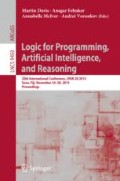Abstract
FEMaLeCoP is a connection tableau theorem prover based on leanCoP which uses efficient implementation of internal learning-based guidance for extension steps. Despite the fact that exhaustive use of such internal guidance can incur a significant slowdown of the raw inferencing process, FEMaLeCoP trained on related proofs can prove many problems that cannot be solved by leanCoP. In particular on the MPTP2078 benchmark, FEMaLeCoP adds 90 (15.7 %) more problems to the 574 problems that are provable by leanCoP. FEMaLeCoP is thus the first AI/ATP system convincingly demonstrating that guiding the internal inference algorithms of theorem provers by knowledge learned from previous proofs can significantly improve the performance of the provers. This paper describes the system, discusses the technology developed, and evaluates the system.
C. Kaliszyk—Supported by the Austrian Science Fund (FWF): P26201.
J. Urban—Supported by NWO grant nr. 612.001.208 and ERC Consolidator grant nr. 649043 AI4REASON.
Access this chapter
Tax calculation will be finalised at checkout
Purchases are for personal use only
Notes
- 1.
The hardware used is Intel Xeon E7-4870 2.30 GHz with 256 GB RAM.
References
Alama, J., Heskes, T., Kühlwein, D., Tsivtsivadze, E., Urban, J.: Premise selection for mathematics by corpus analysis and kernel methods. J. Autom. Reasoning 52(2), 191–213 (2014)
Blanchette, J.C., Kaliszyk, C., Paulson, L.C., Urban, J.: Hammering towards QED. J. Formalized Reasoning (2015, in press)
Carlson, A., Cumby, C., Rosen, J., Roth, D.: The SNoW learning architecture. Technical report UIUCDCS-R-99-2101, UIUC Computer Science (1999)
Gauthier, T., Kaliszyk, C.: Matching concepts across HOL libraries. In: Watt, S.M., Davenport, J.H., Sexton, A.P., Sojka, P., Urban, J. (eds.) CICM 2014. LNCS, vol. 8543, pp. 267–281. Springer, Heidelberg (2014)
Ibens, O., Letz, R.: Subgoal alternation in model elimination. In: Galmiche, D. (ed.) TABLEAUX 1997. LNCS, vol. 1227, pp. 201–215. Springer, Heidelberg (1997)
Jones, K.S.: A statistical interpretation of term specificity and its application in retrieval. J. Documentation 28, 11–21 (1972)
Kaliszyk, C., Urban, J.: Stronger automation for Flyspeck by feature weighting and strategy evolution. In: Blanchette, J.C., Urban, J. (eds.) PxTP 2013. EPiC Series, vol. 14, pp. 87–95. EasyChair (2013)
Kaliszyk, C., Urban, J.: MizAR 40 for Mizar 40. J. Autom. Reasoning 55, 245–256 (2015)
Kaliszyk, C., Urban, J., Vyskocil, J.: Efficient semantic features for automated reasoning over large theories. In: Yang, Q., Wooldridge, M. (eds.) IJCAI 2015, pp. 3084–3090. AAAI Press (2015)
Kaliszyk, C., Urban, J., Vyskočil, J.: Certified connection tableaux proofs for HOL Light and TPTP. In: Leroy, X., Tiu, A. (eds.) Proceedings of the 4th Conference on Certified Programs and Proofs (CPP 2015), pp. 59–66. ACM (2015)
Kühlwein, D., Blanchette, J.C., Kaliszyk, C., Urban, J.: MaSh: machine learning for Sledgehammer. In: Blazy, S., Paulin-Mohring, C., Pichardie, D. (eds.) ITP 2013. LNCS, vol. 7998, pp. 35–50. Springer, Heidelberg (2013)
Otten, J.: Restricting backtracking in connection calculi. AI Commun. 23(2–3), 159–182 (2010)
Otten, J., Bibel, W.: leanCoP: lean connection-based theorem proving. J. Symb. Comput. 36(1–2), 139–161 (2003)
Schulz, S.: Learning Search Control Knowledge for Equational Deduction. DISKI, vol. 230. Infix Akademische Verlagsgesellschaft (2000)
Urban, J., Hoder, K., Voronkov, A.: Evaluation of automated theorem proving on the Mizar Mathematical Library. In: Fukuda, K., Hoeven, J., Joswig, M., Takayama, N. (eds.) ICMS 2010. LNCS, vol. 6327, pp. 155–166. Springer, Heidelberg (2010)
Urban, J., Vyskočil, J., Štěpánek, P.: MaLeCoP: Machine Learning Connection Prover. In: Brünnler, K., Metcalfe, G. (eds.) TABLEAUX 2011. LNCS, vol. 6793, pp. 263–277. Springer, Heidelberg (2011)
Author information
Authors and Affiliations
Corresponding author
Editor information
Editors and Affiliations
Rights and permissions
Copyright information
© 2015 Springer-Verlag Berlin Heidelberg
About this paper
Cite this paper
Kaliszyk, C., Urban, J. (2015). FEMaLeCoP: Fairly Efficient Machine Learning Connection Prover. In: Davis, M., Fehnker, A., McIver, A., Voronkov, A. (eds) Logic for Programming, Artificial Intelligence, and Reasoning. LPAR 2015. Lecture Notes in Computer Science(), vol 9450. Springer, Berlin, Heidelberg. https://doi.org/10.1007/978-3-662-48899-7_7
Download citation
DOI: https://doi.org/10.1007/978-3-662-48899-7_7
Published:
Publisher Name: Springer, Berlin, Heidelberg
Print ISBN: 978-3-662-48898-0
Online ISBN: 978-3-662-48899-7
eBook Packages: Computer ScienceComputer Science (R0)

